- Home
- Jhumpa Lahiri
The Namesake Page 2
The Namesake Read online
Page 2
"Yes, all right," Ashima says.
Patty helps Ashima out of bed, tucks her feet one by one into slippers, drapes a second nightgown around her shoulders. "Just think," Patty says as Ashima struggles to stand. "In a day or two you'll be half the size." She takes Ashima's arm as they step out of the room, into the hallway. After a few feet Ashima stops, her legs trembling as another wave of pain surges through her body. She shakes her head, her eyes filling with tears. "I cannot."
"You can. Squeeze my hand. Squeeze as tight as you like."
After a minute they continue on, toward the nurses' station. "Hoping for a boy or a girl?" Patty asks.
"As long as there are ten finger and ten toe," Ashima replies. For these anatomical details, these particular signs of life, are the ones she has the most difficulty picturing when she imagines the baby in her arms.
Patty smiles, a little too widely, and suddenly Ashima realizes her error, knows she should have said "fingers" and "toes." This error pains her almost as much as her last contraction. English had been her subject. In Calcutta, before she was married, she was working toward a college degree. She used to tutor neighborhood schoolchildren in their homes, on their verandas and beds, helping them to memorize Tennyson and Wordsworth, to pronounce words like sign and cough, to understand the difference between Aristotelian and Shakespearean tragedy. But in Bengali, a finger can also mean fingers, a toe toes.
It had been after tutoring one day that Ashima's mother had met her at the door, told her to go straight to the bedroom and prepare herself; a man was waiting to see her. He was the third in as many months. The first had been a widower with four children. The second, a newspaper cartoonist who knew her father, had been hit by a bus in Esplanade and lost his left arm. To her great relief they had both rejected her. She was nineteen, in the middle of her studies, in no rush to be a bride. And so, obediently but without expectation, she had untangled and rebraided her hair, wiped away the kohl that had smudged below her eyes, patted some Cuticura powder from a velvet puff onto her skin. The sheer parrot green sari she pleated and tucked into her petticoat had been laid out for her on the bed by her mother. Before entering the sitting room, Ashima had paused in the corridor. She could hear her mother saying, "She is fond of cooking, and she can knit extremely well. Within a week she finished this cardigan I am wearing."
Ashima smiled, amused by her mother's salesmanship; it had taken her the better part of a year to finish the cardigan, and still her mother had had to do the sleeves. Glancing at the floor where visitors customarily removed their slippers, she noticed, beside two sets of chappals, a pair of men's shoes that were not like any she'd ever seen on the streets and trams and buses of Calcutta, or even in the windows of Bata. They were brown shoes with black heels and off-white laces and stitching. There was a band of lentil-sized holes embossed on either side of each shoe, and at the tips was a pretty pattern pricked into the leather as if with a needle. Looking more closely, she saw the shoemaker's name written on the insides, in gold lettering that had all but faded: something and sons, it said. She saw the size, eight and a half, and the initials U.S.A. And as her mother continued to sing her praises, Ashima, unable to resist a sudden and overwhelming urge, stepped into the shoes at her feet. Lingering sweat from the owner's feet mingled with hers, causing her heart to race; it was the closest thing she had ever experienced to the touch of a man. The leather was creased, heavy, and still warm. On the left shoe she had noticed that one of the crisscrossing laces had missed a hole, and this oversight set her at ease.
She extracted her feet, entered the room. The man was sitting in a rattan chair, his parents perched on the edge of the twin bed where her brother slept at night. He was slightly plump, scholarly-looking but still youthful, with black thick-framed glasses and a sharp, prominent nose. A neatly trimmed mustache connected to a beard that covered only his chin lent him an elegant, vaguely aristocratic air. He wore brown socks and brown trousers and a green-and-white-striped shirt and was staring glumly at his knees.
He did not look up when she appeared. Though she was aware of his gaze as she crossed the room, by the time she managed to steal another look at him he was once again indifferent, focused on his knees. He cleared his throat as if to speak but then said nothing. Instead it was his father who did the talking, saying that the man had gone to St. Xavier's, and then B.E. College, graduating first-class-first from both institutions. Ashima took her seat and smoothed the pleats of her sari. She sensed the mother eyeing her with approval. Ashima was five feet four inches, tall for a Bengali woman, ninety-nine pounds. Her complexion was on the dark side of fair, but she had been compared on more than one occasion to the actress Madhabi Mukherjee. Her nails were admirably long, her fingers, like her father's, artistically slim. They inquired after her studies and she was asked to recite a few stanzas from "The Daffodils." The man's family lived in Alipore. The father was a labor officer for the customs department of a shipping company. "My son has been living abroad for two years," the man's father said, "earning a Ph.D. in Boston, researching in the field of fiber optics." Ashima had never heard of Boston, or of fiber optics. She was asked whether she was willing to fly on a plane and then if she was capable of living in a city characterized by severe, snowy winters, alone.
"Won't he be there?" she'd asked, pointing to the man whose shoes she'd briefly occupied, but who had yet to say a word to her.
It was only after the betrothal that she'd learned his name. One week later the invitations were printed, and two weeks after that she was adorned and adjusted by countless aunts, countless cousins hovering around her. These were her last moments as Ashima Bhaduri, before becoming Ashima Ganguli. Her lips were darkened, her brow and cheeks dotted with sandalwood paste, her hair wound up, bound with flowers, held in place by a hundred wire pins that would take an hour to remove once the wedding was finally over. Her head was draped with scarlet netting. The air was damp, and in spite of the pins Ashima's hair, thickest of all the cousins', would not lie flat. She wore all the necklaces and chokers and bracelets that were destined to live most of their lives in an extra-large safety deposit box in a bank vault in New England. At the designated hour she was seated on a piri that her father had decorated, hoisted five feet off the ground, carried out to meet the groom. She had hidden her face with a heart-shaped betel leaf, kept her head bent low until she had circled him seven times.
Eight thousand miles away in Cambridge, she has come to know him. In the evenings she cooks for him, hoping to please, with the unrationed, remarkably unblemished sugar, flour, rice, and salt she had written about to her mother in her very first letter home. By now she has learned that her husband likes his food on the salty side, that his favorite thing about lamb curry is the potatoes, and that he likes to finish his dinner with a small final helping of rice and dal. At night, lying beside her in bed, he listens to her describe the events of her day: her walks along Massachusetts Avenue, the shops she visits, the Hare Krishnas who pester her with their leaflets, the pistachio ice cream cones she treats herself to in Harvard Square. In spite of his meager graduate student wages he sets aside money to send every few months to his father to help put an extension on his parents' house. He is fastidious about his clothing; their first argument had been over a sweater she'd shrunk in the washing machine. As soon as he comes home from the university the first thing he does is hang up his shirt and trousers, donning a pair of drawstring pajamas and a pullover if it's cold. On Sundays he spends an hour occupied with his tins of shoe polishes and his three pairs of shoes, two black and one brown. The brown ones are the ones he'd been wearing when he'd first come to see her. The sight of him cross-legged on newspapers spread on the floor, intently whisking a brush over the leather, always reminds her of her indiscretion in her parents' corridor. It is a moment that shocks her still, and that she prefers, in spite of all she tells him at night about the life they now share, to keep to herself.
On another floor of the hospital, in a waiting room, A
shoke hunches over a Boston Globe from a month ago, abandoned on a neighboring chair. He reads about the riots that took place during the Democratic National Convention in Chicago and about Dr. Benjamin Spock, the baby doctor, being sentenced to two years in jail for threatening to counsel draft evaders. The Favre Leuba strapped to his wrist is running six minutes ahead of the large gray-faced clock on the wall. It is four-thirty in the morning. An hour before, Ashoke had been fast asleep, at home, Ashima's side of the bed covered with exams he'd been grading late at night, when the telephone rang. Ashima was fully dilated and being taken to the delivery room, the person on the other end had said. Upon arrival at the hospital he was told that she was pushing, that it could be any minute now. Any minute. And yet it seemed only the other day, one steel-colored winter's morning when the windows of the house were being pelted with hail, that she had spit out her tea, accusing him of mistaking the salt for sugar. To prove himself right he had taken a sip of the sweet liquid from her cup, but she had insisted on its bitterness, and poured it down the sink. That was the first thing that had caused her to suspect, and then the doctor had confirmed it, and then he would wake to the sounds, every morning when she went to brush her teeth, of her retching. Before he left for the university he would leave a cup of tea by the side of the bed, where she lay listless and silent. Often, returning in the evenings, he would find her still lying there, the tea untouched.
He now desperately needs a cup of tea for himself, not having managed to make one before leaving the house. But the machine in the corridor dispenses only coffee, tepid at best, in paper cups. He takes off his thick-rimmed glasses, fitted by a Calcutta optometrist, polishes the lenses with the cotton handkerchief he always keeps in his pocket, A for Ashoke embroidered by his mother in light blue thread. His black hair, normally combed back neatly from his forehead, is disheveled, sections of it on end. He stands and begins pacing as the other expectant fathers do. So far, the door to the waiting room has opened twice, and a nurse has announced that one of them has a boy or a girl. There are handshakes all around, pats on the back, before the father is escorted away. The men wait with cigars, flowers, address books, bottles of champagne. They smoke cigarettes, ashing onto the floor. Ashoke is indifferent to such indulgences. He neither smokes nor drinks alcohol of any kind. Ashima is the one who keeps all their addresses, in a small notebook she carries in her purse. It has never occurred to him to buy his wife flowers.
He returns to the Globe, still pacing as he reads. A slight limp causes Ashoke's right foot to drag almost imperceptibly with each step. Since childhood he has had the habit and the ability to read while walking, holding a book in one hand on his way to school, from room to room in his parents' three-story house in Alipore, and up and down the red clay stairs. Nothing roused him. Nothing distracted him. Nothing caused him to stumble. As a teenager he had gone through all of Dickens. He read newer authors as well, Graham Greene and Somerset Maugham, all purchased from his favorite stall on College Street with pujo money. But most of all he loved the Russians. His paternal grandfather, a former professor of European literature at Calcutta University, had read from them aloud in English translations when Ashoke was a boy. Each day at tea time, as his brothers and sisters played kabadi and cricket outside, Ashoke would go to his grandfather's room, and for an hour his grandfather would read supine on the bed, his ankles crossed and the book propped open on his chest, Ashoke curled at his side. For that hour Ashoke was deaf and blind to the world around him. He did not hear his brothers and sisters laughing on the rooftop, or see the tiny, dusty, cluttered room in which his grandfather read. "Read all the Russians, and then reread them," his grandfather had said. "They will never fail you." When Ashoke's English was good enough, he began to read the books himself. It was while walking on some of the world's noisiest, busiest streets, on Chowringhee and Gariahat Road, that he had read pages of The Brothers Karamazov, and Anna Karenina, and Fathers and Sons. Once, a younger cousin who had tried to imitate him had fallen down the red clay staircase in Ashoke's house and broken an arm. Ashoke's mother was always convinced that her eldest son would be hit by a bus or a tram, his nose deep into War and Peace. That he would be reading a book the moment he died.
One day, in the earliest hours of October 20, 1961, this nearly happened. Ashoke was twenty-two, a student at B.E. College. He was traveling on the 83 Up Howrah-Ranchi Express to visit his grandparents for the holidays; they had moved from Calcutta to Jamshedpur upon his grandfather's retirement from the university. Ashoke had never spent the holidays away from his family. But his grandfather had recently gone blind, and he had requested Ashoke's company specifically, to read him The Statesman in the morning, Dostoyevsky and Tolstoy in the afternoon. Ashoke accepted the invitation eagerly. He carried two suitcases, the first one containing clothes and gifts, the second empty. For it would be on this visit, his grandfather had said, that the books in his glass-fronted case, collected over a lifetime and preserved under lock and key, would be given to Ashoke. The books had been promised to Ashoke throughout his childhood, and for as long as he could remember he had coveted them more than anything else in the world. He had already received a few in recent years, given to him on birthdays and other special occasions. But now that the day had come to inherit the rest, a day his grandfather could no longer read the books himself, Ashoke was saddened, and as he placed the empty suitcase under his seat, he was disconcerted by its weightlessness, regretful of the circumstances that would cause it, upon his return, to be full.
He carried a single volume for the journey, a hardbound collection of short stories by Nikolai Gogol, which his grandfather had given him when he'd graduated from class twelve. On the title page, beneath his grandfather's signature, Ashoke had written his own. Because of Ashoke's passion for this particular book, the spine had recently split, threatening to divide the pages into two sections. His favorite story in the book was the last, "The Overcoat," and that was the one Ashoke had begun to reread as the train pulled out of Howrah Station late in the evening with a prolonged and deafening shriek, away from his parents and his six younger brothers and sisters, all of whom had come to see him off and had huddled until the last moment by the window, waving to him from the long dusky platform. He had read "The Overcoat" too many times to count, certain sentences and phrases embedded in his memory. Each time he was captivated by the absurd, tragic, yet oddly inspiring story of Akaky Akakyevich, the impoverished main character who spends his life meekly copying documents written by others and suffering the ridicule of absolutely everyone. His heart went out to poor Akaky, a humble clerk just as Ashoke's father had been at the start of his career. Each time, reading the account of Akaky's christening, and the series of queer names his mother had rejected, Ashoke laughed aloud. He shuddered at the description of the tailor Petrovich's big toe, "with its deformed nail as thick and hard as the shell of a tortoise." His mouth watered at the cold veal and cream pastries and champagne Akaky consumed the night his precious coat was stolen, in spite of the fact that Ashoke had never tasted these things himself. Ashoke was always devastated when Akaky was robbed in "a square that looked to him like a dreadful desert," leaving him cold and vulnerable, and Akaky's death, some pages later, never failed to bring tears to his eyes. In some ways the story made less sense each time he read it, the scenes he pictured so vividly, and absorbed so fully, growing more elusive and profound. Just as Akaky's ghost haunted the final pages, so did it haunt a place deep in Ashoke's soul, shedding light on all that was irrational, all that was inevitable about the world.
Outside the view turned quickly black, the scattered lights of Howrah giving way to nothing at all. He had a second-class sleeper in the seventh bogie, behind the air-conditioned coach. Because of the season, the train was especially crowded, especially raucous, filled with families on holiday. Small children were wearing their best clothing, the girls with brightly colored ribbons in their hair. Though he had had his dinner before leaving for the station, a four-layer tiffin carri
er packed by his mother sat at his feet, in the event that hunger should attack him in the night. He shared his compartment with three others. There was a middle-aged Bihari couple who, he gathered from overhearing their conversation, had just married off their eldest daughter, and a friendly, potbellied, middle-aged Bengali businessman wearing a suit and tie, by the name of Ghosh. Ghosh told Ashoke that he had recently returned to India after spending two years in England on a job voucher, but that he had come back home because his wife was inconsolably miserable abroad. Ghosh spoke reverently of England. The sparkling, empty streets, the polished black cars, the rows of gleaming white houses, he said, were like a dream. Trains departed and arrived according to schedule, Ghosh said. No one spat on the sidewalks. It was in a British hospital that his son had been born.
"Seen much of this world?" Ghosh asked Ashoke, untying his shoes and settling himself cross-legged on the berth. He pulled a packet of Dunhill cigarettes from his jacket pocket, offering them around the compartment before lighting one for himself.
"Once to Delhi," Ashoke replied. "And lately once a year to Jamshedpur."
Ghosh extended his arm out the window, flicking the glowing tip of his cigarette into the night. "Not this world," he said, glancing disappointedly about the interior of the train. He tilted his head toward the window. "England. America," he said, as if the nameless villages they passed had been replaced by those countries. "Have you considered going there?"

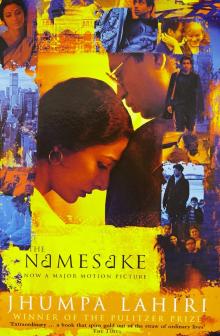 The Namesake
The Namesake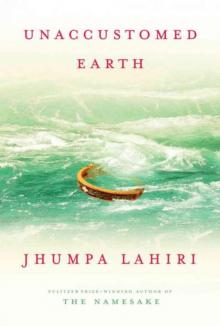 Nobody's Business
Nobody's Business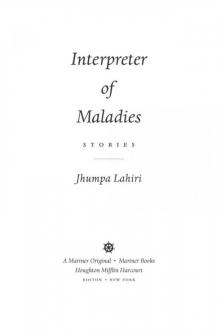 Interpreter of Maladies
Interpreter of Maladies Hell-Heaven
Hell-Heaven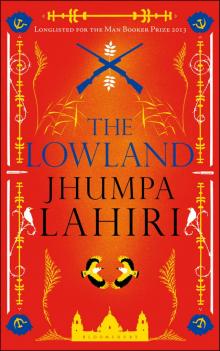 The Lowland
The Lowland Unaccustomed Earth
Unaccustomed Earth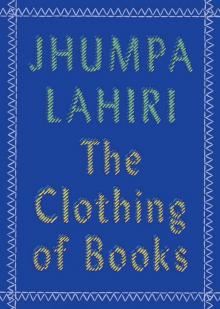 The Clothing of Books
The Clothing of Books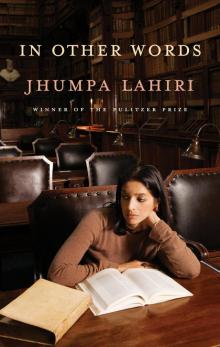 In Other Words
In Other Words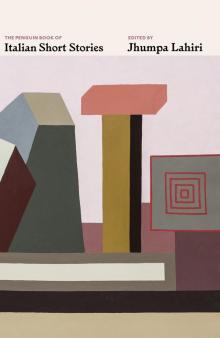 The Penguin Book of Italian Short Stories
The Penguin Book of Italian Short Stories